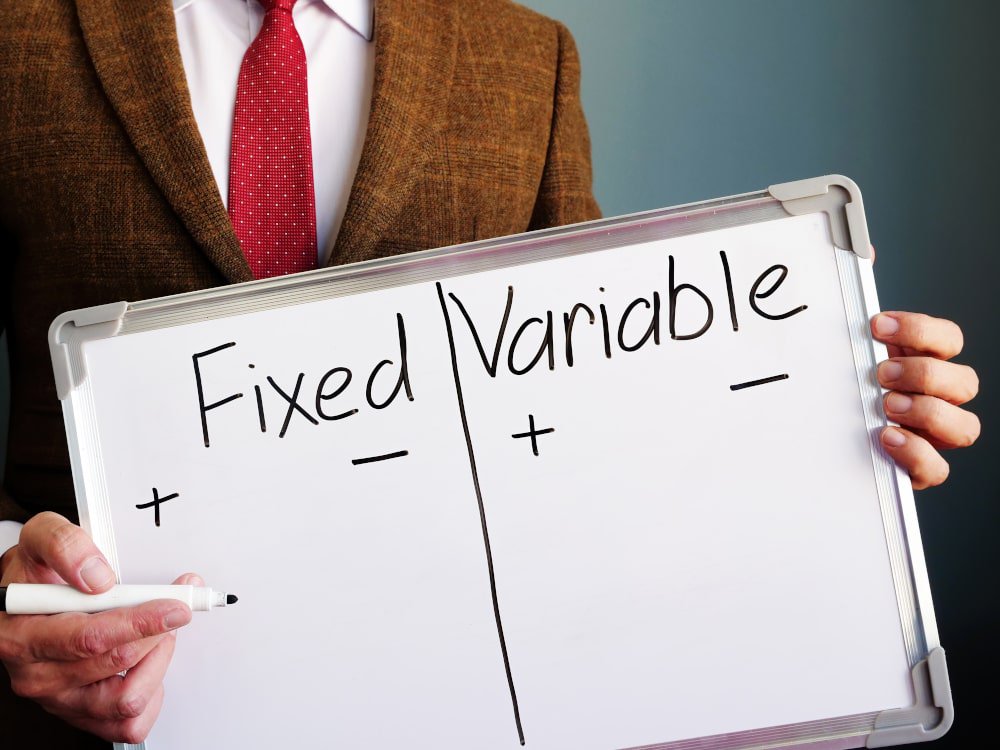Is It Time to Switch to a Fixed Rate?

The Difference Between Variable and Fixed Rates
When applying for a mortgage, one of the biggest decisions you will need to make is whether to take on a fixed or variable rate mortgage. Before doing so, however, it is important to understand the difference between fixed mortgage rates and variable mortgage rates, and the ways in which they can impact the overall cost of your mortgage.
Fixed Interest Rates
A fixed interest rate is one that remains consistent for a pre-established period of time called a term. Terms typically range from 1-5 years, but can extend up to 10 years in some cases. Currently, 5 year fixed-rate mortgages are the most popular mortgage product across Canada.
As fixed interest rates remain consistent across the entire lifespan of a mortgage loan, fixed rate mortgages are popular amongst risk-averse homebuyers. If you choose a fixed rate mortgage, the consistency of your rate will protect against the risk of rising rates, and make it easier to budget your future mortgage payments.
It is also critical to note that once you have opted into a fixed rate mortgage, it might be impossible to switch into a variable rate mortgage without breaking your mortgage, depending on the specific terms and conditions of your mortgage, and you may end up incurring significant penalties. As such, it is important to consider all factors before making your decision.
Variable Interest Rates
A variable rate mortgage is a loan with an interest rate that changes over time, in response to fluctuations in the market. This rate is calculated by discounting the current prime rate, and can vary based on decisions made by the Bank of Canada.
Typically, variable rates will be lower than fixed rates— given that they are a riskier choice for borrowers. As such, it may sometimes seem as though variable rates will always be lower, but they can sometimes climb higher than fixed rates, as was demonstrated this past year.
Unlike fixed rates, variable rates can be changed to a fixed rate without breaking the mortgage or incurring little to no penalties, depending on the terms and conditions of your mortgage.
Should You Switch to a Fixed Rate?
If you currently have a mortgage plan with a variable interest rate, you may be able to transition to a fixed rate mortgage without incurring any additional penalties. However, before making the jump, it is important to consider whether switching to a fixed rate mortgage would be the right choice for you both in the short term and the long run.
Since historically rates on variable rate mortgages have usually been lower than fixed rate mortgages, you might incur a mild increase in your mortgage rate by switching to a fixed rate. As mentioned previously, these days, many fixed rate mortgages are lower than their variable counterparts, so you might be saving by switching. It typically only makes sense to switch to a fixed rate if you expect interest rates to continue increasing in the future, and you want to lock in a lower rate while you can. There are exceptions to this rule of course.
We can see examples of this phenomenon in our current housing market— borrowers who locked in a fixed rate in 2020, when rates were at an all-time low, are paying far less in interest payments than borrowers who kept variable rates. Even borrowers who switched to a fixed rate in 2021, or at the beginning of 2022, were able to avoid the effects of the subsequent rate hikes.
The real question is whether we expect interest rates to continue increasing, and for how long. Anyone with a mortgage, whether fixed or variable rate, may be impacted for the next ten years or longer by interest rate fluctuations. While the Bank of Canada has been steadily increasing interest rates throughout 2021 and 2022, they will eventually have to start decreasing rates to boost the economy and prevent a catastrophic recession.
According to Bank of Canada projections, rates will not start to decline until early 2024 when inflation has subsided sufficiently. However, the Central Bank may decrease rates in 2023 if the economy contracts more severely and quickly than anticipated. For more information, check out our take on the Canadian mortgage rate forecast for 2023.
If the former is true, locking into a fixed rate now may help protect you against the still rising rates. If the latter is true, however, keeping a variable rate may allow you to benefit from the future potential lowered rates (e.g. rates keep rising for a year but then drop, and stay low, for the next five years). Your choice will depend on whether you are taking a short-term or long-term approach to your mortgage budgeting, and upon your personal predictions on the housing market correction.
How to Know Which Option Is Best for Your Mortgage Plan
In order to determine which interest rate option is the best choice for your mortgage plan, it is important to first identify your personal mortgage goals. If you are looking to sell or refinance your home in just a few years, you may be more interested in short-term savings than a long-term pay-off. On the other hand, if you are looking to enter into a 30-year mortgage that you intend to pay off until maturity, you may value long-term savings over short-term gains.
If you are a buyer that values consistency and risk-avoidance, you may prefer a fixed rate mortgage. On the other hand, if you expect the Bank of Canada to begin lowering mortgage rates before the end of 2023 or early 2024 and want to take advantage of that trend, you may find a variable rate mortgage to be more appropriate. Variable rate mortgages are for the most part also easier and less expensive to break than fixed rate mortgages. If you are intending on breaking your mortgage anytime soon, a variable rate mortgage may be best for you.
Whether you choose to proceed with a fixed or variable mortgage rate, it is also important to remember that individual rates may vary based on your credit score, income, debt history, and more. Different lenders may also have different requirements for different interest rates. While your interest rate can sometimes be negotiated, oftentimes the easiest way to reduce your expenses is by improving your financial position ahead of your mortgage application. For more information, check out our guide on how to save on your mortgage.
If you are still unsure about which mortgage plan is best for you, consulting an expert can help. Here at Clover Mortgage, our experienced team of brokers has helped connect homebuyers like you with over fifty different lenders and over a hundred different mortgage products. Contact Clover Mortgage today to book your free consultation, and lock in a low rate today!
Resources





